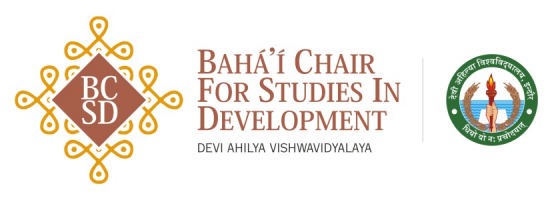The educational programs offered by the Bahá’í Chair seek to build capacity in individuals to contribute to social and economic development by drawing upon interdisciplinary perspectives from the social sciences and spiritual insights from religion. These programs seek to develop conceptual understanding along with the intellectual skills needed to be an effective contributor to the positive transformation of society.
Given below is the calendar for the courses being offered in the academic year 2020-2021 along with a brief description of each course and necessary guidance for enrolling to each.1. Environmental Ethics
The Bahá’í Chair is proud to announce the commencement of a post-graduate certificate course on ‘Environmental Ethics’. The course is ideally suited for postgraduate students and professionals in the field of development who seek to develop an ethical framework for thought and behaviour that can guide development policy and practice as they relate to humanity’s relationship with the natural environment. This course is divided into three units – the first unit explores some traditional ethical theories and their application to environment issues; the second focuses on reconceptualizing humanity’s relationship with nature and the third unit is dedicated to analyzing the challenging issue of balancing the imperatives of protecting the environment while at the same time addressing the developmental needs of Indian society.
Eligibility conditions: Undergraduate degree
Fluency in English (reading, written
and spoken)
Duration: 17 weeks
Important dates
Deadline for Registration: 5 July 2024
Course commencement: August 2024
To apply Click here.
Environmental Ethics Brochure 2024-2025
2. Knowledge, Participation and Development
In a rapidly-changing world that is becoming ever more complex and interconnected, it is increasingly apparent that the a harmonious and prosperous humanity will require a fundamental reordering of systems and structures in the world to reflect to ever greater degrees the principles of the oneness of humankind and justice. This has many revolutionary implications for the field of development at the level of both theory and methods. Paternalistic approaches and models that view development as an endeavour of one section of humanity for another will have to be set aside in favour of the more mature conception of the masses of humanity arising out of the state of being passive beneficiaries of development programs to becoming active agents of their own and their society’s progress. This empowerment of the masses can only be achieved when their capacities are built to draw upon, apply and, in the process, generate knowledge for advancing their spiritual and material development. This calls for not only a broadening of the sources of knowledge that development draws upon and greater integration between them but also the use of methodologies that enable participatory knowledge generation and that closely integrate theory and practice in iterative cycles of action, reflection and learning.
The course, “Knowledge, Participation and Development”, aims to help prepare students develop their conceptual understanding of how diverse knowledge systems including science, religion, local knowledge and indigenous systems of knowledge can be drawn upon in defining the ends and means of development and how various biases and blindspots that undermine development thinking can be identified and overcome. The course further explores the philosophical basis and the methods of various development methodologies that incorporate knowledge generation and learning as essential elements of the development process.
The course is particularly suited for those broadly engaged in the fields of social and economic development concerned with the empowerment of the masses.
Eligibility conditions: Undergraduate degree
Fluency in English (reading, written
and spoken)
Duration: 17 weeks
Important dates
Deadline for Registration: 5 July 2024
Course commencement: December 2024
To apply Click here.
Knowledge Participation Development Brochure 2024-2025
3. World Unity: A 20th Century Historical Perspective
This course aims to help students understand and analyze humanity’s movement towards the unification of humankind and justice by studying world historical events and processes over the course of the twentieth century. It helps students learn to read history from a perspective that regards humanity’s social evolution as being impelled by the moral imperatives of establishing ever widening circles of unity and justice.
Through participation in this course students will be enabled to develop a historically- grounded appreciation of the meaning and implications of the principles of the oneness of humankind and justice. This understanding in turn will enhance their capacities to engage in purposeful social action aimed at building a more just and united society.
Eligibility conditions: Undergraduate degree
Fluency in English (reading, written
and spoken)
Duration: 17 weeks
Important dates
Deadline for Registration: 15 June 2024
Course commencement: December 2024
To apply Click here.

